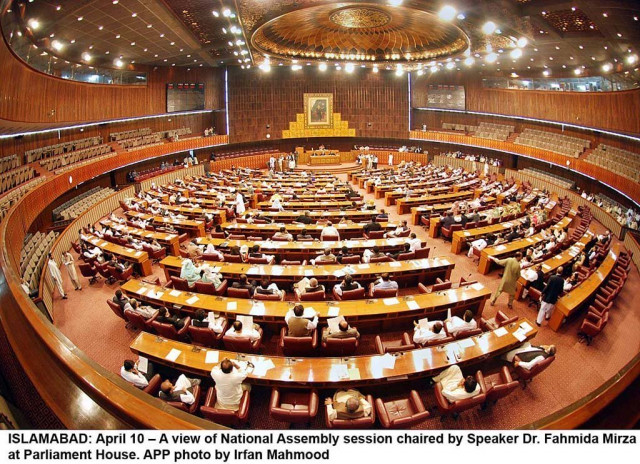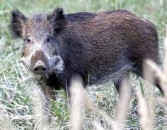Divided house unites to support Kashmiris
Parliament passes resolutions seeking special OIC summit on rights abuses in IOJ&K

National Assembly of Pakistan. PHOTO: APP
The resolutions – presented by Senator Shibli Faraz in the Senate and MNA Syed Fakhar Imam in the National Assembly – also called upon the Organisation of Islamic Cooperation (OIC) to “immediately convene” a special summit to discuss “grave human rights violations” in Indian Occupied Jammu and Kashmir (IOJ&K).
The two houses of parliament emphasised that on Feb 5 (today) ‘International Day of Solidarity’ is being observed across the globe to express solidarity with the people of IOJ&K who have been living under siege for more than seven decades under a “fierce” and “cruel Indian occupation”.
The MPs demanded that India immediately reverse and rescind its illegal actions of Aug 5 and Oct 31, 2019, repeal the draconian laws such as Public Safety Act and Armed Forces Special Powers Act, pull out its occupation troops from IOJ&K and lift its six-month long inhuman lockdown, communication blockade and media blackout.
On Aug 5, the Narendra Modi government revoked Article 370 of its Constitution, which gave the disputed Himalayan region a semi-autonomous status. It also bifurcated IOJ&K on Oct 31 into two union territories – one Jammu and Kashmir and the other Buddhist-dominated Ladakh region.
The MPs expressed grave concern over the presence of more than 900,000 Indian military personnel thereby turning the disputed territory into a virtual open prison and making it one of the most militarised areas of the world.
They condemned the past and present Indian atrocities, including detention of over 13,000 Kashmiri youth at undisclosed locations, use of pellet guns by the Indian military against innocent civilians, and torture and humiliation of civilians.
The lawmakers denounced the horrifying violence against women, especially the use of rape as a weapon of war, by the Indian forces.
The lawmakers urged the United Nations Security Council (UNSC) to compel India to allow Military Observers Group in India and Pakistan into IOJ&K.
They also demanded that India immediately allow international human rights and humanitarian organisations and parliamentarians of the UN-affiliated countries as well as international media access to IOJ&K, so that they could assess and report the human rights situation there.
The MPs heaped praise on the courageous and valiant people of IOJ&K as well as paid tributes to all those men, women and children who have laid down their lives fighting for their inalienable right to self-determination over seven decades.
They denounced India's deliberate targeting of civilian population with intensified ceasefire violations, which have led to the death of Kashmiris across the Line of Control, further threatening peace and security in the region.
The lawmaker also expressed concern at the illegal detention and long incarceration of leaders from different political parties, particularly the Hurriyat leaders like Yasin Malik and Shabbir Shah who was first arrested when he was 14-year old and kept behind the bars on and off.
Minister for Aviation Ghulam Sarwar Khan recalled that “the United Nations had passed two resolutions granting the Kashmiris the right to decide their future through a plebiscite.”
The minister said the UN also passed resolutions on East Timor and South Sudan and both became separate states after some years. He slammed the world powers for their double standards and for not implementing the UN resolutions on Kashmir.
“Muslims are being exploited across the world including in countries like Afghanistan, Iraq, Syria and Palestine,” he said, adding that India was carrying out massive human rights violations in IOJ&K.
Ali Gohar of the opposition PML-N said the Indian government showed its real face and annexed Kashmir and declared it its territory. “Kashmir is an integral part of Pakistan and will remain so,” he said, adding that the opposition, including the PML-N and the PPP, had set aside their political differences to stand together for the Kashmir cause.
Minister for Science and Technology Fawad Chaudhry said Pakistan had fought three wars on Kashmir and was ready to respond to Indian aggression, adding that Pakistan wanted peace in the region but this desire should not be considered a weakness.
“India and Pakistan are nuclear powers and any war will destroy both of them,” he added.
He lauded the Kashmiri leaders, including Mirwaiz Umar Farooq, Syed Ali Geelani and Asiya Andrabi, for their long struggle against the Indian oppression.
Abdul Qadir Patel of the PPP condemned the Indian move of turning Kashmir into a jail, violating airspace of Pakistan, usurping freedom of Kashmir and putting the whole population of Kashmir valley under curfew. He complained of lack of support from Muslim countries on the issue of Kashmir.
Amir Haider Hoti of the opposition ANP urged the MPs to have unanimity of views on the Kashmir issue the same way parliament had developed consensus when Pakistan fought its war against terrorism and carried out military operations in Swat and other areas.
Kesoo Mal Kheeal Das said, “Minorities in Pakistan stand with Kashmiris.”
Naz Baloch said, “India has deployed hundreds of thousands of troops in Kashmir and has taken away the rights of Kashmiris as well as tortured elderly and youth and raped women and girls.”
Kashmiris should be given their right to self-determination and the world should make efforts for resolving the Kashmir issue, she added.
Khurram Dastgir said that “for Pakistan, Kashmir is not just a territorial dispute as it is striving for securing the right to self-determination of Kashmiris”.
“Indian troops have killed 100,000 Kashmiris and raped women,” he said, urging to expose these atrocities before the international community.
Minister of State for Climate Change Zartaj Gul said Kashmiris felt honoured to bury their martyrs in the flag of Pakistan.
(With additional input from APP.)



















COMMENTS
Comments are moderated and generally will be posted if they are on-topic and not abusive.
For more information, please see our Comments FAQ